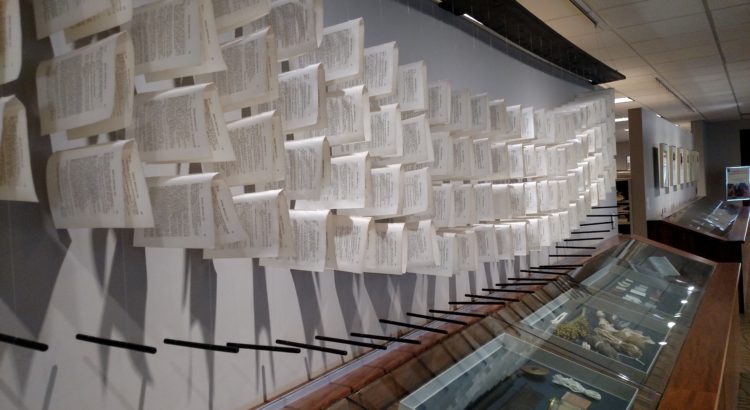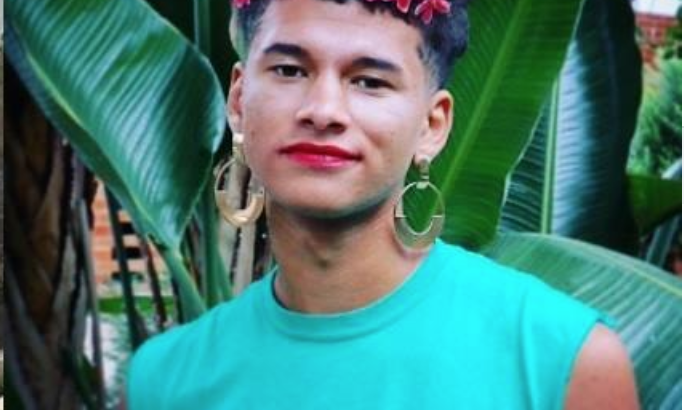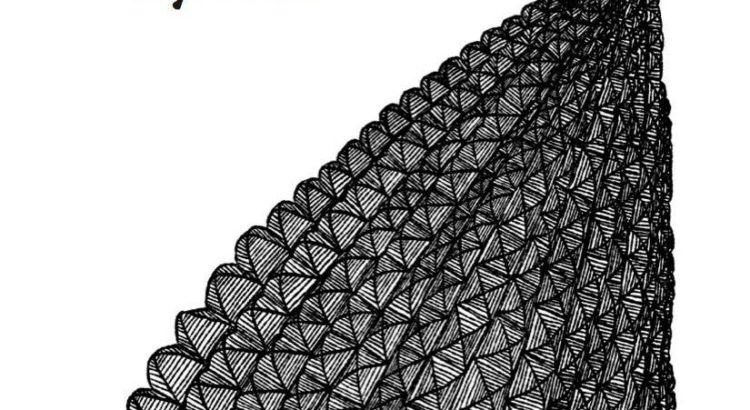As I’m becoming more familiar and learning to recognize the intersecting pathways of my identity, I have learned to cultivate a deep appreciation for artists of different identities doing the same. Gala Mukomolova is one such artist who I believe may be able to shed light on the landscape of complex, often even opposing, experiences, and using art as a form of synthesis. From the few poems I have read, Mukomolova seems to have a rich sense of voice and a kaleidescopic, evocative representation of the world around her. I look forward to her reading on Thursday, September 5th at 5:30-7 pm in UMMA’s Helmut Sterne auditorium. A book signing will follow with book sales provided by Literati bookstore.
Category: Literary Arts

REVIEW: Bookmarks: Speculating the Future of the Library
Spread across campus in the Hatcher Graduate Library, Shapiro Undergraduate Library, and the Art, Architecture & Engineering Library, Bookmarks: Speculating the Future of the Library is a mixed media exploration that does just that.
The main installation in the Hatcher Graduate Library, In Search of the Pale Blue Spin, is an audio walk through the library created by Stephanie Rowden & Jennifer Metsker. Visitors may use their own personal device or borrow an mp3 player and headphones from the information desk. The walk is inspired by Jorge Luis Borges’s short story Tlön, Uqbar, Orbis Tertius, and although I found the context of the story confusing, I must believe that that was part of the point.
More than anything, In Search of the Pale Blue Spin encourages “travelers” to stop and notice the details of the library. The calm voices in the recording, along with ethereal string bass and clarinet, usher listeners out of the everyday. You may have spent hours doing homework at the Hatcher Graduate Library, but have you ever stopped to take in the mosaic-like paintings in the North entrance, the arched ceiling of the reference room that is reminiscent of a train station, or the carvings of men in horses on the second floor?  As the voice in
As the voice in  the recording led me through the stacks in search of a mysterious book about Earth, I was able to be present in the library in a way that studying there doesn’t allow. I had never really stopped to take in the illuminated stained-glass window depicting a boat at sea, and I certainly had never noticed that it includes the letters “U M” at the top. Furthermore, I had never even been to some of the areas that the audio walk took me through.
the recording led me through the stacks in search of a mysterious book about Earth, I was able to be present in the library in a way that studying there doesn’t allow. I had never really stopped to take in the illuminated stained-glass window depicting a boat at sea, and I certainly had never noticed that it includes the letters “U M” at the top. Furthermore, I had never even been to some of the areas that the audio walk took me through.
Along the way, there are other pieces of art that are a part of Bookmarks. One of these works, Sophia  Brueckner’s work Captured by an Algorithm, appears to be a set of Victorian-style porcelain plates at first look. However, further scrutiny, and a reading of the artwork’s description, reveals that the plates are printed with images made by applying Photoshop’s Photomerge algorithm to scans of romance novel covers. Each plate also includes a Kindle Popular Highlight from a romance novel. In other words, the set is a juxtaposition between what is old and what is new, and between what appears to be and what is.
Brueckner’s work Captured by an Algorithm, appears to be a set of Victorian-style porcelain plates at first look. However, further scrutiny, and a reading of the artwork’s description, reveals that the plates are printed with images made by applying Photoshop’s Photomerge algorithm to scans of romance novel covers. Each plate also includes a Kindle Popular Highlight from a romance novel. In other words, the set is a juxtaposition between what is old and what is new, and between what appears to be and what is.
Despite my enjoyment of In Search of the Pale Blue Spin, I cannot agree with its view of the library’s future. After heightening listeners’ appreciation of the library, the audio concludes, “Some of us have appointments to get to. Some of us are just tired. We need to say goodbye now. We need to say goodbye to the library, though we hope that it will still exist.” The World Book Encyclopedia may have become obsolete in the age of the Internet, but this does not mean that libraries are dead. They certainly are changing and must continue to, but evolution is the very thing that prevents extinction. In the twenty-first century, libraries have the opportunity to embrace and expand their role as epicenters of community and education, and we should be giving them new life by working to make them as accessible and relevant as possible, not mourning their death. We should not and cannot write off libraries just because the world (inevitably) is changing.
Bookmarks: Speculating the Future of the Library is free and open to the public and will continue through May 26. For more information, visit the exhibition’s webpage.

REVIEW: Aldo Leopoldo Pando Girard Poetry Reading
 I really enjoyed Aldo Leopoldo Pando Girard’s poetry reading at Literati. He was charismatic and well-spoken, and the audience was very supportive. The reading itself was very interactive: people responded through snaps, claps, and cheers.
I really enjoyed Aldo Leopoldo Pando Girard’s poetry reading at Literati. He was charismatic and well-spoken, and the audience was very supportive. The reading itself was very interactive: people responded through snaps, claps, and cheers.
Girard read from his book Self Portraits, Mixed Media, published by Red Beard Press. His poetry was vulnerable, political, and skillfully crafted. The poems were often conversational and contained clever linguistic surprises. Some of the themes in his poetry included seasons, college, sadness, identity, race, bilingualism (specifically Spanish and English), queerness, the cosmos, and politics. Girard seemed very comfortable in front of a crowd. His background in slam poetry was evident when he came alive with gestures and facial expressions, and how he manipulated sounds and rhythms in some of his poems. It was a delight to see the performance side of his work.
Some of my favorite lines I heard him read:
“My whole body is woven with stories”
“Fall up into the stars”
“My ribs are an earthquake”
His reading was followed by a Q & A and book signing. During the Q & A, he talked about his role as the 2018-2019 Ann Arbor Youth Poet Laureate, a position I was not familiar with. As a Youth Poet Laureate, he is conducting a social justice project, mentoring teens at the Neutral Zone, leading workshops on poetry performance and editing, and educating people about the diversity and power of poetry. He is also putting together a chapbook featuring works by youths of color in the Ann Arbor-Ypsilanti area. The chapbook will be released at the end of May.
During the Q & A, Girard also talked about his creative process as well as the differences between spoken word and page poetry. He usually determines whether a piece is meant to be spoken or not during his editing process. For his spoken pieces, he utilizes double meanings and wordplay, and he edits them so they can be easily understood when read aloud. Whereas for page poetry, he allows the poems to have more complicated meanings, which may only be deciphered through closer readings.
For poets who are just starting out, he recommends reading a lot because the field of poetry is diverse. Referencing other people’s work can expose you to unique ideas on what is defined as “poetry” and what “poetry” can do. He also says that “editing is most of writing” and that it is crucial to find a community through which you can receive feedback about your work.
You can purchase his book of poetry, Self Portraits, Mixed Media, as well as I Name This Body Mine (which features some of his work) both at Literati for $12. Also, be sure to read the reviews on the backs of the books, several famous writers have great things to say about Girard’s work.
Upcoming Events featuring Aldo Leopoldo Pando Girard:
- Ann Arbor Youth Laureate Commencement Performance: https://aadl.org/node/388703
- Downtown Library
- 5/23/19, 7-8:30 pm
- Poetry Workshops: Mondays 4:30-6pm @ the Neutral Zone


REVIEW: Xylem Release Party
Xylem, according to the opening letter of the 2018-2019 issue, has existed since 1990. I myself have been a part of the two most recent issues of the magazine, and even in the span of that one year it evolved immensely. I can’t imagine what it must be like to be a part of a publication with that type of history and capacity for growth. This year’s issue presented a unique collection of artists, each expressing their own forms of metamorphosis. While the release event itself was inspiring, the magazine is what I would like to preserve in writing.
One of the pieces that stood out to me during my initial read through of the magazine was Notes on Colors by Christine Mackenzie. Instead of normal stanza breaks, Notes on Colors separates lines with simple dashes. This creates a stream of consciousness feel to the read of the poem, which strengthens its subject matter. Notes on Colors, to me, is about being able to associate other senses with the perception of visual color. The poem utilizes a lot of nature imagery, like the feeling of wind to evoke the blue sky of a summer’s day or cranberry juice drying on your tongue to evoke the heat of redness. All in all, it’s a brilliant poem focusing on multiple forms of perception to solidify its expression of one.
Another piece that was particularly striking was Elizabeth Le’s Out of Many, One. The aspects of the poem that I found the most captivating were in its discussion of “broken language.” This is a theme I’ve discussed many times in past classes, so I’m familiar with its academic discourse and what it can bring to a classroom conversation. Despite that, I haven’t come across that theme a lot in my everyday life, so I thought it was refreshing to know the subject matter in a different context.
Out of Many, One accomplishes a lot in the small space of the poem. The narrative voice contrasts itself with certain aspects of her mother, illustrating how eloquent the mother figure is and how inadequate the narrator feels by comparison. The importance of physical beauty and musical talent are important to the narrator because they are emblematic of her culture. The narrator, however, feels as if she doesn’t belong to neither American culture nor her native one. Most of this internal struggle stems from observations she makes about language. Le ends her poem with “Bless it despite its ugliness. / Bless it / anyway.” It was a powerful poem with an optimistic conclusion.
The cover of the magazine itself is also really cool, with a glossy feel to it and a stark black and white color scheme. Images are printed in color on special paper in the middle of the magazine. While I understand the practicality of that, part of me wishes the images were spread a little more throughout the other works. Overall, however, I’m really glad to be featured in the 2018-2019 issue of Xylem, with my work residing alongside many other incredible pieces of art.

PREVIEW: Xylem Release Party
Xylem is one of The University of Michigan’s literary magazines. The magazine features University of Michigan undergraduate artwork, including poetry, fiction, creative nonfiction, artwork and photography.
Tomorrow, April 9th, Xylem Literary Magazine is hosting their annual release party to celebrate the newest issue of their magazine. From 7-9pm, the event will be held in the West Conference Room of Rackham Graduate School (on the 4th floor). Published authors and artists will get a chance to grab copies of the magazine, read their work, and celebrate another successful issue of Xylem!
REVIEW: Polly Rosenwaike Fiction Reading
I was really excited to see a full house at Polly Rosenwaike’s reading at Literati. She read the first story from her book Look How Happy I’m Making You, titled “Grow Your Eyelashes.” There was a Q & A afterwards hosted by her colleague, followed by a book signing. There were a few speaking points that really stuck with me.
One was Rosenwaike’s description of her writing process and timeline. She said that this book took her twelve years to write—which equates to about twenty pages per year. She is not a fan of outlines; instead, she often starts with an idea or a feeling, or she moves the story forward based on her characters’ motivations. This makes me think of the process for crafting a poem. The birth of most poems, from personal experience, begin with an idea. But because of the nature of poetry—how it is a culmination of linguistic surprises and skill—the poem unfolds itself as it is written. Poets often do not know what the finished product will look like. Once it is on paper, the poem seems to grow separate from the poet. This felt very much true about Rosenwaike’s work. Many of her short stories have been published in various magazines before she released her book. They have grown over time, and she has edited each narrative based on where each one wanted to go and what they wanted to do.
Another talking point that resonated with me was her process of choosing a title. She went through several ideas, some of which were rejected by her editor (such as “Baby Person”). Initially, she read through poems for inspiration. Eventually, she skimmed through her own stories and found the line that she thought was both intriguing and informative on the overarching themes and purpose within the short stories. “Look How Happy I’m Making You” was said by one of her characters who appeared in “Grow Your Eyelashes.”
“Grow Your Eyelashes,” and other stories in the book, interlaces the joys, griefs, and ironies of early motherhood. From wanting a baby, to needing a baby, people often romanticize parenthood. Even from the beginning, they search for answers. Do babies really make people happier? How do you care for this new living being? There are books and articles and poems and essays on how to raise a child. Motherhood propels people toward the search of information and the need for a community. As Rosenwaike said, infants are very much like birds. They flap and chirp and make a mess. They don’t yet communicate (at least well), and it can often feel like a one-sided relationship when you are a mother. It is not until later that the child begins to become “more human.” Motherhood and the domestic role of a woman comes with unforgiving scrutiny. How can one survive it without a supportive community?
Rosenwaike’s book is in conversation with Rachel Cussk’s A Life’s Work: On Becoming a Mother, and Helen Simpson’s Getting a Life.
You can purchase her book at places like Literati, Amazon, and Barnes & Noble.
More info on Polly Rosenwaike can be found here.









